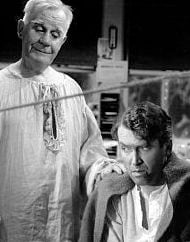 It's Still a Wonderful Life
It's Still a Wonderful Life
Advent is just around the corner. This year, I will make time to watch It’s a Wonderful Life yet again.
Some folks dismiss the film as corny and sentimental. I have never seen it that way.
When I first saw It’s a Wonderful Life forty-two years ago, it was not that well known. I happened upon it while surfing the three channels we had back then one December afternoon. I was struck by the film’s dark tone and the deep melancholy of George Bailey, the main character.
It’s a Wonderful Life became a staple Christmas offering for local television stations in the 1970’s and 1980’s. Since 1994 it has been shown every Christmas Eve on NBC.
Although God and Saint Peter figure in the plot, the movie is not overtly religious. It takes a rather bland, “offend no one”, approach to faith. God is more of a fairy tale figure and ironically (for a Christmas movie), Christ is not even mentioned. Even as a teenager, I was bothered by the fact that they confused angels and saints. Clarence, George Bailey’s guardian angel, used to be human? What was that all about?
Faulty theology aside, the movie has some elements that should resonate with the Catholic viewer. Here are themes in It’s a Wonderful Life that stand out if viewed through a Catholic lens.
The value of life. This theme plays out on two levels. The plot centers on the value of George Bailey’s life as an individual. He is allowed to see how the lives around him would have been affected if he had never been born. Thus he learns the value and purpose of his own life.
The film also serves as a good illustration of the openness to children in marriage. George’s family grows throughout the course of the film. Although George seems overwhelmed by his responsibilities as a father, it is also clear that he is open to his wife’s desire to have a large home filled with children.
Parent and child relationships drive the story. George Bailey began to set aside his personal goals to honor his father’s wishes and take over the family business. The arrival of his own children kept him anchored in his work and in his community. As he is transported from his own life to an alternate world where he had never been born, it is a cluster of rose petals belonging to his daughter Zuzu (again, obviously not a Catholic family!) that serve as a sign that he has returned to his real life.
Social justice and stewardship. George hates the “dusty old building and loan” and feels trapped because he knows he’s the only one that can keep it going. Like George’s antagonist, Henry Potter, Bailey is a capitalist. Unlike Potter, he sees that the just management of capital has a profound impact on the community. His poor and working class customers are able to earn a modest return on their savings, and have access to affordable home loans. Potter, owner of the commercial bank considers the poor a bad credit risk and would prefer that they rent housing from him.
When Potter dismissed the workers and small merchants of Bedford Falls as “discontented rabble”, George Bailey defends them and his family’s approach to business;
“Just remember this, Mr. Potter, that this rabble you're talking about...they do most of the working and paying and living and dying in this community. Well, is it too much to have them work and pay and live and die in a couple of decent rooms and a bath? Anyway, my father didn't think so. People were human beings to him, but to you, a warped frustrated old man, they're cattle. Well, in my book he died a much richer man than you'll ever be!”
Discernment. It’s a wonderful life, but George had no idea it was until the last reel. In most of the film, God is pointing him in one direction, while he looks in another. Even when God directly intervenes in his life, he is maddeningly slow to catch on to what is happening. He is God’s gift to his town and his family. They are God’s gifts to him, yet he spends most of his life yearning to be somewhere else. He spends most of his time ignoring clues that the life he was living was the one he was meant to live.
Prayer and the communion of saints. The story develops and the plot crisis occurs as the result of human actions but it is prayer that provides the resolution. It is the intercession of angels, the prayers of his family and friends and finally, George’s willingness to get down on his knees and pray for himself that saves his life and presumably his soul.
Hollywood theology comes into play once again in the final scene as we are told “Every time you hear a bell ring, an angel gets his wings” It makes for a cute Hollywood ending, but we know better, don’t we?
Copyright 2012 Kirk Whitney
About the Author

Guest
We welcome guest contributors who graciously volunteer their writing for our readers. Please support our guest writers by visiting their sites, purchasing their work, and leaving comments to thank them for sharing their gifts here on CatholicMom.com. To inquire about serving as a guest contributor, contact editor@CatholicMom.com.


.png?width=1806&height=731&name=CatholicMom_hcfm_logo1_pos_871c_2728c%20(002).png)
Comments